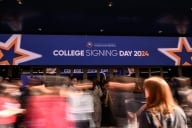You have /5 articles left.
Sign up for a free account or log in.
Last month, U.S. News & World Report removed the ranking (it had been No. 1) of Temple University's online M.B.A. program, amid suggestions from some that four years of top rankings for the program were questionable.
Then on Friday, Temple's president announced that Fox School of Business was going further than just investigating errors in data on its online program. "In light of the recently discovered issue with data for the online M.B.A. program, and out of respect for the U.S. News rankings, the Fox School contacted the publication yesterday and asked to be withdrawn from consideration in the upcoming results for full-time and part-time M.B.A. programs."
Temple is not the first business school to get in trouble over data used to calculate M.B.A. rankings.
Last year, U.S. News removed the rankings of George Washington University's full-time and part-time programs after the university admitted that it had submitted incorrect data in 2016. In that year, George Washington originally reported GMAT score averages of 671 and 611, respectively, for full-time and part-time students. The actual figures were 643 and 581. While the scores were all above average on the GMAT scale, in which 800 is the maximum score, the originally reported scores made GW appear more competitive than it is. The average GMAT score counts for 16.5 percent of the U.S. News formula for ranking business schools.
In 2013, Tulane University fessed up to having submitted bad data to U.S. News that inflated its business school's rankings. (U.S. News repeatedly says, whenever inaccurate data are uncovered, that it trusts colleges to submit accurate information and does not audit the data that come in.)
U.S. News is not the only rankings entity to run into data problems. Poets & Quants, a website that both does M.B.A. rankings and acts as something of a watchdog on others, reported recently that Financial Times removed the ranking of the IE Business School, a respected freestanding business school in Spain, over concerns about "irregularities" in surveys of alumni that may have included nonalumni of the class being surveyed.
Data irregularities are only one reason that business school rankings face scrutiny. Last year 21 scholars at a range of business schools called for changes in the way business schools are ranked. They argued that traditional methods -- which reduce business schools to ordinal rankings -- are deceptive and biased toward certain kinds of M.B.A. and other business school programs.
The persistence of business school rankings -- and of colleges taking them seriously (sometimes perhaps to the point of fudging data) -- raises a question. Why are they so important to so many applicants and why, thus, do they have such power? Views differ.
Noah Teitelbaum, head of pre-business programs at Kaplan Test Prep, said he talks to prospective business school students all the time and that they value rankings highly.
Teitelbaum said he sees business school rankings as different from those of law or medical schools because "one of the major benefits of an M.B.A. is an expanded professional network," so would-be students "often use rankings as a proxy for the quality of the network." He said that can be a narrow view with which to judge a business school, but it's one he sees a lot. The emphasis on the cohort in a class, he said, means that the rankings may be "as important to alumni as to applicants," and that increases pressure on business schools to have high rankings.
In advising students on making choices, Teitelbaum said that he always stresses that students should look for the best fit, irrespective of rankings, but he said rankings clearly have power.
As to why there seem to be many issues about data accuracy, Teitelbaum said he thinks the existence of many b-school rankings could "increase the possibility of malfeasance by a few bad actors on the school side." But he said this is no excuse, and that rankings operators should punish business schools found to have submitted false data. "Prospective students deserve better," he said.
Chad Troutwine, CEO of Veritas Prep, said that he spoke to several former admissions officials on his staff, and they noted how easy it is to accidentally give a wrong number for a ranking. He said it is key to find out (as Temple says it is trying to do) whether the bad data were submitted intentionally. "It seems likely," Troutwine said.
He agreed that the numerous M.B.A. rankings, along with the many subcategories of rankings, may encourage all kinds of strategies by business schools, if not in cheating, then in "gaming" the system.
But Troutwine said he considers individual business school rankings by various publications to be less influential than those in other fields, where there is a single dominant player. "Several M.B.A. programs can claim to be the world's No. 1 program -- and even point to a ranking to support their claim. Only Yale Law School can credibly claim to be the No. 1 law school."








